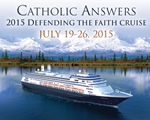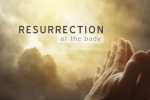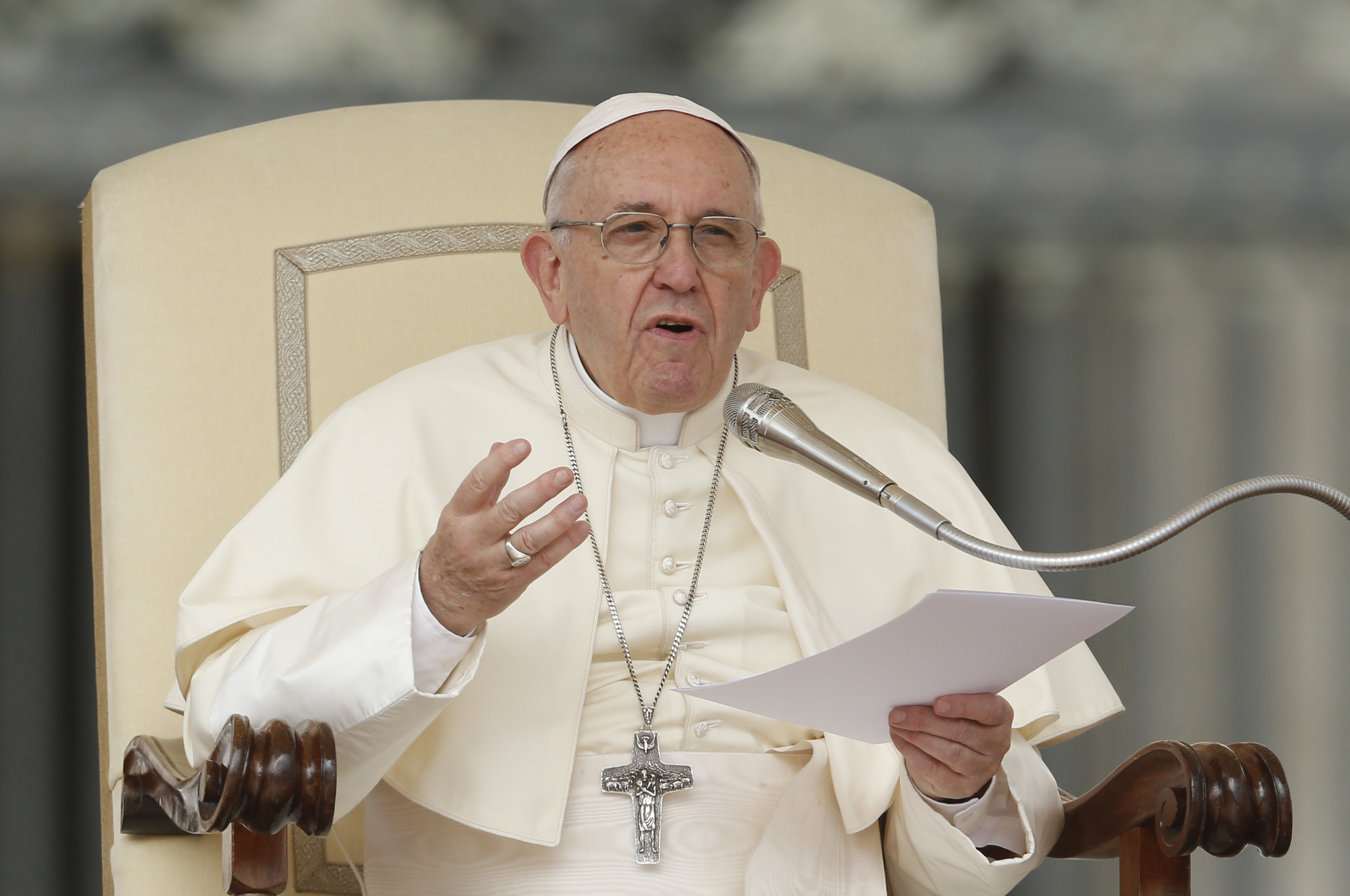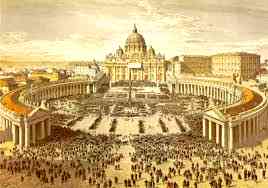Does the Catholic Church Teach We Are Gods?
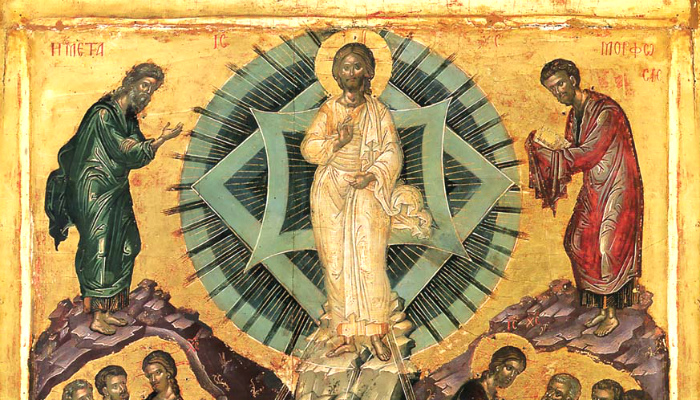
A common question I get as a Catholic apologist is rooted in a somewhat controversial paragraph from the Catechism of the Catholic Church (460):
The Word became flesh to make us “partakers of the divine nature”: “For this is why the Word became man, and the Son of God became the Son of man: so that man, by entering into communion with the Word and thus receiving divine sonship, might become a son of God.” “For the Son of God became man so that we might become God.” “The only-begotten Son of God, wanting to make us sharers in his divinity, assumed our nature, so that he, made man, might make men gods.”
On the surface, it looks troubling here especially because of the capital “G” where it says, quoting the great fourth-century defender of the Faith, St. Athanasius: “For the Son of God became man so that we might become God.” To some it looks like the Catholic Church is teaching a kind of pantheism (everything is God) or even polytheism (there are many gods). This is not the case. There are five points to be made here:
1. The Catechism of the Catholic Church makes very clear in paragraph 300 that pantheism is false when it says:
God is infinitely greater than all his works: “You have set your glory above the heavens.” Indeed, God’s “greatness is unsearchable”. But because he is the free and sovereign Creator, the first cause of all that exists, God is present to his creatures’ inmost being: “In him we live and move and have our being.” In the words of St. Augustine, God is “higher than my highest and more inward than my innermost self”.
The distinction between God and creation could not be clearer. The Church rejects pantheism.
2. In paragraph 2112, the Catechism also condemns polytheism:
The first commandment condemns polytheism. It requires man neither to believe in, nor to venerate, other divinities than the one true God.
The Catholic Church has always condemned and will always condemn both pantheism and polytheism. Neither is being taught in CCC 460. Moreover, the Church condemns the error of henotheism as well, i.e., the idea that we worship one main God, but there may be many other lesser or even greater “Gods” in the universe. This is akin to what Mormonism espouses. The Fourth Lateran Council tells us in its Constitutions, ch. 1, “On the Catholic Faith”:
We firmly believe and simply confess that there is only one true God, eternal and immeasurable, almighty, unchangeable, incomprehensible and ineffable, Father, Son and Holy Spirit, three persons but one absolutely simple essence, substance or nature.
The CCC 212 says it this way:
God is unique; there are no other gods besides him. He transcends the world and history. He made heaven and earth… God is ‘HE WHO IS’, from everlasting to everlasting, and as such remains ever faithful to himself and to his promises.
3. If you look at the context of CCC 460, it is clear that the Church is teaching the very biblical concept of “theosis” (divinization) or that man is called by grace to participate in the divine nature. We do not become God in the sense that we become equal with God. That would be absurd and absolutely antithetical to Scripture and the teaching of the Church. In fact, the context of CCC 460 makes very clear when it says, “The Word became flesh to make us ‘partakers of the divine nature’,” and, “The only-begotten Son of God, wanting to make us sharers in his divinity, assumed our nature…” that it is talking about man participating in divinity by gift, not being equal with God. In footnote 78, the Catechism references II Peter 1:4 as biblical support:
… by which he has granted to us his precious and very great promises, that through these you may escape from the corruption that is in the world because of passion, and become partakers of the divine nature.
The Catholic Church is simply being faithful to Scripture in teaching man to be partakers of the divine nature by grace.
4. Where the English translation says, quoting St. Athanasius of Alexandria in the fourth century, “For the son of God became man so that we might become God,” the official Latin text actually reads, “Ipse siquidem homo factus est, ut nos dii efficeremur.” Literal translation: “For the Son of God became man so that we might be made gods.” The Latin term “dii” translated “God” in the English translation of the Catechism is actually nominative plural and is NOT capitalized. Unfortunately, the English translation of the official Latin text gets it wrong. “God” should be “gods.”
Part of the problem here may well go back to the original Greek of St. Athanasius from which the Catechism quotes. In the text of St. Athanasius the Catechism quotes, he actually wrote, “Αὐτὸς γὰρ ἐνηνθρώπισεν, ἵνα ἡμεῖς θεοποιηθῶμεν (Migne, Patrologia Graeca, 25, 192 B De incarnatione Verbi, 54), which translates literally: “For he was made man in order that we might be deified.” The verb θεοποιηθῶμεν, or theopoiethomen, is where the problem lies. This is a compound of two Greek words that mean “god” and “to make.” So one could see how a translator could translate it as “might be made God.” However, the word carries the connotation of participation in rather than actually becoming God. It is normally translated as “deified.” And if anyone reads St. Athanasius’ work, it is very clear that is the sense in which he was using it. It appears that the mistranslation in the Catechism may well have its origin in a mistranslation of the original Greek text from St. Athanasius.
Whatever the origin of the mistranslation, this much is clear. The biggest part of the problem we have here lies in a poor translation of the actual, official, and normative Latin text of CCC 460. But all should know that translations are just that… translations. It is only the original Latin text that is authoritative.
For people outside the Church this may sound strange, but we have an analogy in Sacred Scripture that our Protestant friends can appreciate. Let’s say we have a bad translation of Sacred Scripture. And there have been and are a lot of those. I like to use the famous “Adulterers Bible” published in 1631 by Robert Barker and Martin Lucas, the royal printers in London at the time. It was basically a reprint of the King James Bible, but with a number of flaws. The most famous of which was found in their translation of the Ten Commandments, specifically the sixth commandment (seventh for Protestants) in Exodus 20:14. They forgot the word “not” in “Thou shalt not commit adultery.” It read “Thou shalt commit adultery.” No honest person would cast aspersion upon the Sacred Text because of a poor translation like this. Similarly, a poorly translated word in a translation of the official Latin text of the Catechism should not be used to cast aspersion upon the Church. No doubt, future editions of our English translation of the Catechism will make corrections.
5. We should also note that even with the poor translation, we are not talking about anything heretical here. We are talking about an ambiguity due to poor linguistics. The context makes clear that the Church is not attempting to say Christians somehow become equal with God. The word itself should be understood in the context in which it is being written. So even if the Church intended to write “God” instead of “gods” here, the context would make clear that we are still talking about men being partakers of divinity and not being made equal with God. The Catholic Church teaches that we do become “gods” but only in that sense of participation in the divine nature as I’ve said.
6. It is crucial for us to understand in what sense Scripture speaks of theosis or God’s people as participating in the divine nature. Yes, men are referred to as “gods” in Scripture and we need to know why. We cannot ever be “gods” as Mormons claim we can be. The famous quip in Mormonism, “As we are God once was; as God is we will become” is a definite no-no in Catholic and biblical Christianity. But without understanding properly the concept of “theosis,” Fundamentalist and Evangelical Protestants (and other sects as well) often find themselves unable to deal with key biblical texts that are used by Mormons to reinforce their henotheistic understanding. For example, after having declared the truth of his divinity by saying “I and the Father are one” in John 10:30, which then caused the Jews present to “pick up stones to stone [Jesus]” because they knew he had just proclaimed himself to be God, Jesus responded, in verses 34-38:
Is it not written in your law, “I said, you are gods?” If he called them gods to whom the word of God came (and the Scripture cannot be nullified), do you say of him whom the Father consecrated and sent into the world, “You are blaspheming,” because I said, “I am the Son of God?” If I am not doing the works of my Father, then do not believe me, but if I do them, even though you do not believe me, believe the works, that you may know and understand that the Father is in me and I am in the Father.
Jesus is here quoting Psalm 82:6, where God himself refers to the “princes” of Israel as “gods” inasmuch as they represent God to his people.
I say, “You are gods, sons of the Most High, all of you; nevertheless, you shall die like men, and fall like any prince.”
The Hebrew word used for God here is “Elohim,” which is the most common word used for God in the Old Testament. Indeed, in Exodus and elsewhere in the Old Testament we have multiple examples of people of God, judges in particular, being referred to as “gods” (see Exodus 22:8, twice in 22:9, and Psalm 82:1). The idea here is that “rulers” in Israel wield God’s authority as judges and as such are “gods.” Well, in the New Testament, Christians are much more radically joined to God through Jesus Christ so that they share even more profoundly in prerogatives that belong to God alone in a strict sense. Here is a brief list of just some of them:
1. God alone is “Father” in a strict sense, according to Matt. 23:9, yet many among the people of God are referred to and named “fathers” via participation in God. See Luke 16:24, Acts 7:2, I John 2:13-14, Eph. 3:14-15, I Cor. 4:14-15.
2. Christ alone is “teacher” according to Matt. 23:8 (Gr. didaskolos), yet many among God’s people are called to be “teachers” in Him. See James 3:1, Eph. 4:11, etc.
3. Christ alone is our “shepherd and bishop” (Gr. poimaine and episkopos) according to I Peter 2:25, yet we have many “shepherds” and “bishops” in the New Covenant Church. See Eph. 4:11, I Tim. 3:1, Acts 20:28, etc.
4. Christ alone is our “leader” (Gr. kathegetes) according to Matt. 23:10 and yet we have many “leaders” in the Church (Heb. 13:17; 24).
Those who participate in that which belongs to God alone in a strict and infinite sense do not take away from God; they participate in God through a gift of grace. The same can be said for we Christians as “sons of God.” Christ alone is the “only begotten Son” according to John 1:18; 3:16, etc., yet Christians are called “sons of God” and “born of God” in Galatians 4:4-7, Romans 8:14-17, I John 3:9, I John 5:18, etc. In fact, we should note here that angels are referred to as “sons of God” in Job 1:6 and sons of Seth were called “sons of God” in Genesis 6:4—obviously via participation and not by nature—even in the Old Testament. The New Covenant reveals Christians to be sons of God not only through participation, but even more intimately and radically via adoption. Christ alone is “Son” by nature, but it is entirely proper and biblical to refer to all of the above as sons.
Thus, with all of this as a backdrop, we can see how texts of Scripture that proclaim there to be only one true God, i.e., John 17:3, I Cor. 8:5-6, etc., do not contradict a text like John 10:34 where Jesus himself refers to the people of God as “gods.” The latter are “gods” via participation, God alone is God by nature.
Concluding Thoughts:
We do not speak often of the truth that the people of God are “partakers of the divine nature,” probably because of the confusion it causes from those who do not know the Faith and the Bible very well, but that is a shame. If Jesus Christ revealing himself to be “the Son of God” was one of the most profound ways he revealed his divinity in the New Testament—and it was—then our being “sons of God” reveals our participation in divinity as well. Are we “God” by nature? Of course not! But we are partakers of the divine nature. And this is extremely significant for us to know. In the words of Pope St. Leo the Great written over 1,500 years ago from one of his sermon (and found in CCC 1691):
Christian, recognize your dignity and, now that you share in God’s own nature, do not return to your former base condition by sinning. Remember who is your head and of whose body you are a member. Never forget that you have been rescued from the power of darkness and brought into the light of the Kingdom of God.
It is this biblical principle of theosis that is the basis for our understanding of how we can accomplish anything of eternal value in this life. “Apart from me, you can do nothing,” Jesus says in John 15:5. But we can do “all things in [Christ] who strengthens [us]” according to St. Paul in Phillipians 4:13. It is because of the Christian’s participation in divinity that he possesses spiritual gifts in accord with God’s will that empower him to perform miracles and all manner of actions that are beyond his natural capacity. It is because of this participation that his prayers can be efficacious and ultimately—and most importantly—he can merit eternal life as Romans 2:6-8 and Galatians 6:7-9 make clear:
For [God] will render to every man according to his works: to those who by patience in well-doing seek for glory and honor and immortality, he will give eternal life; but for those who are factious and do not obey the truth, but obey wickedness, there will be wrath and fury.
Do not be deceived; God is not mocked, for whatever a man sows, that he will also reap. For he who sows to his own flesh will from the flesh reap corruption; but he who sows to the Spirit will from the Spirit reap eternal life. And let us not grow weary in well-doing, for in due season we shall reap, if we do not lose heart.
When the Catholic Church speaks of “meriting,” we simply mean that we will be rewarded for what we do in cooperation with God’s grace. And as St. Paul says above, part of what we merit, or are rewarded with, because of God’s grace working in us, is eternal life. But we cannot accomplish this on our own. Not only did Jesus say we could do nothing apart from him, St. Paul also made clear that any works done apart from Christ are worthless as far as eternal reward is concerned (see Eph. 2:8-9; Romans 3:28; Gal. 2:16, etc.). However, because of our union with Christ through faith and baptism it is no longer us, but “Christ who lives in [us]” that accomplishes all things (Gal. 2:20). Through Christ and in union with Christ we have truly become “sons of God” and “partakers of the divine nature” whereby we are empowered to do what our own natures could never do. As St. Paul intimated in Romans 2, we can merit “glory” and “immortality.” We can merit “eternal life.”
If you enjoyed this and would like to learn more, click here.
